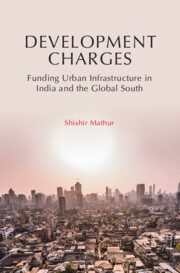Book contents
- Frontmatter
- Contents
- List of Figures
- List of Tables
- Foreword
- Preface
- List of Abbreviations
- 1 Introduction to Development Charges: Normative Bases and Their Role in Local Public Finance
- 2 Use of Development Charges Globally
- 3 Major Design and Implementation Considerations
- 4 Overview of Development Charges in India
- 5 Case Studies of Development Charge Programs
- 6 Recommendations
- 7 Way Forward and Future Research Opportunities
- References
- Index
5 - Case Studies of Development Charge Programs
Published online by Cambridge University Press: 12 January 2024
- Frontmatter
- Contents
- List of Figures
- List of Tables
- Foreword
- Preface
- List of Abbreviations
- 1 Introduction to Development Charges: Normative Bases and Their Role in Local Public Finance
- 2 Use of Development Charges Globally
- 3 Major Design and Implementation Considerations
- 4 Overview of Development Charges in India
- 5 Case Studies of Development Charge Programs
- 6 Recommendations
- 7 Way Forward and Future Research Opportunities
- References
- Index
Summary
Through an in-depth study of several development charge programs from the US and India, this chapter analyzes the case study programs on the major design and implementation factors identified in Chapter 3, such as the enabling legal framework, rational nexus principle, vertical equity, and revenue stability and growth.
After that, this chapter describes a typical new township, calculates its infrastructure funding needs based on the current costs to provide major infrastructure/services in India, and uses the development charge rates noted in the Indian case studies to calculate the revenue likely to accrue from these charges. Next, it compares the need with this revenue and conducts a sensitivity analysis to show how much the development charge rates need to increase in India to meet the infrastructure funding requirements under various scenarios. Under the first scenario, these charges should meet half of the funding needs. The other half would be met through a mix of other revenue sources such as property taxes, user fees, and state/central government aid. Under the second scenario, development charges would meet all funding needs. Finally, the chapter conducts a comparative evaluation of the Indian and US cases along the legal, equity, and revenue yield and adequacy dimensions.
Fremont, CA
The city of Fremont is situated in the south-eastern part of the San Francisco Bay Area region of northern California. The city is growing in population. It added over 16,000 residents between 2010 and 2020 at an annual growth rate of approximately 1 percent to reach a population close to 230,000. The household income is a little over USD 133,000 (US Census Bureau n.d.a)—almost twice the nation’s median income of USD 68,703 (US Census Bureau 2020) and 3/4th more than California’s (USD 75,235) (US CensusBureau n.d.b). The city has a large Asian majority (59 percent), with white(24 percent) and Hispanic (13 percent) residents rounding out the top three races/ethnicities (US Census Bureau n.d.a). Finally, a large majority of residents own their homes (approximately 60 percent), often living in low-density, single-family houses. The city is essentially a medium-sized affluent suburb—one of many that dot the region.
Legal enabling framework
Three layers—national, state, and local—of laws and regulations influence Fremont’s use of impact fees (as mentioned earlier, development charges are called impact fees in the US). As described in Chapter 2, at the national level, the US Constitution’s Fifth Amendment protects citizens against takings.
- Type
- Chapter
- Information
- Development ChargesFunding Urban Infrastructure in India and the Global South, pp. 89 - 155Publisher: Cambridge University PressPrint publication year: 2024

